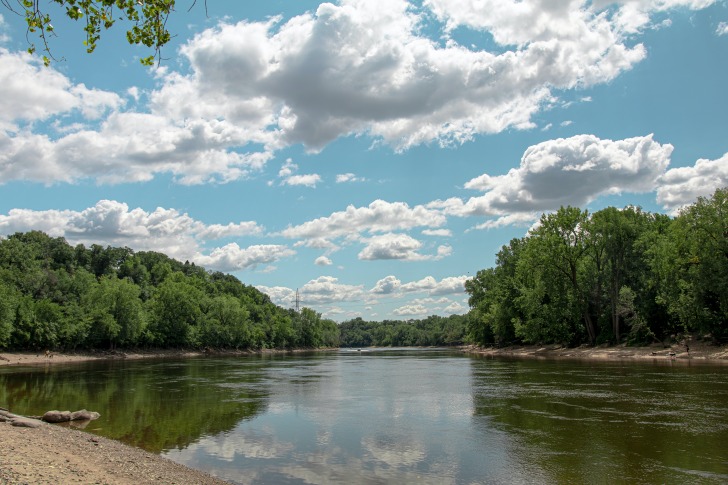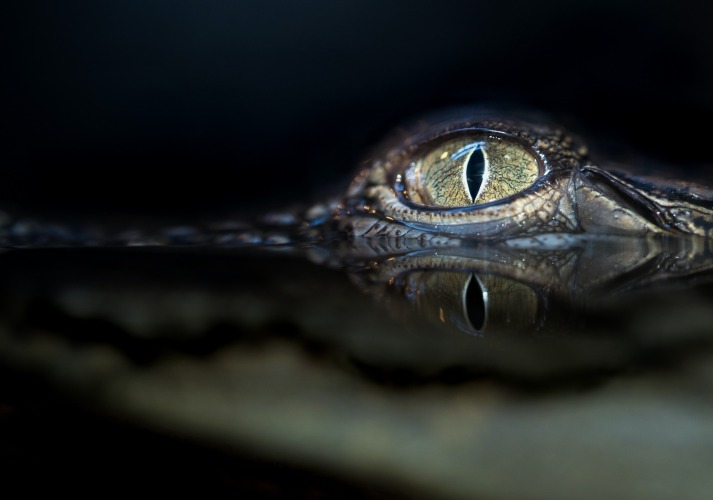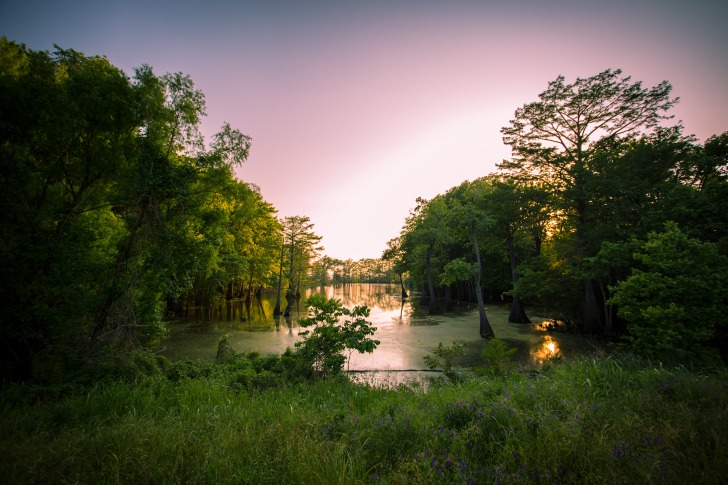As most are already aware, the alligator has typically remained a consistent presence throughout the southeastern United States.
However, this presence was significantly diminished by the time the 1960s arrived.
While the American alligator eventually made its way onto the endangered species, it was not long before this notion was dispelled.
With the American alligator population much safer than skeptics had envisioned, it is time to take a closer look at their presence in one specific area: the Mississippi River.

Contents
- So… Are There Alligators In The Mississippi River?
- Alligator Species In The Mississippi River
- Is It Safe To Swim In The Mississippi River?
- Interesting Alligator Facts for the Mississippi River
- Alligators vs Crocodiles
- 3 Safety Tips for Swimming in Alligator Infested Waters
- Summary
- Frequently Asked Questions
So… Are There Alligators In The Mississippi River?
In a word?
Yes.
Despite the earlier reports about alligator populations diminishing in the region, there are at least 30,000 alligators located within the state of Mississippi.
Most of these alligators reside in the southeastern portion of the state.
Since the state has laws in place that govern the hunting of the species, Mississippi alligators tend to grow a bit larger than many of their counterparts in the southeastern United States.
Louisiana and Florida gators cannot match their size.
In many Mississippi counties, the alligators that are observed are over ten feet long.
There is no reason to worry about the presence of alligators, as they are naturally cautious around humans.
As long as you are keeping your distance, you should be 100 percent safe at all times.
Alligator Species In The Mississippi River
When it comes to the Mississippi River, the American alligator is the primary species that are found there.
These large, armored reptiles are semi-aquatic and are closely related to the crocodile family.
Their bodies will range from six to fourteen feet long.
Their coloration makes them hard to see at times, as they are almost black to the naked eye.
Their nostrils and eyes remain prominent, while their bodies are covered in coarse scales.
Their heads are large and long, with upper teeth that are visible at the jaw’s edge.
These gators’ front feet have five toes, while the rear feet have four and are webbed.
Is It Safe To Swim In The Mississippi River?
This is the type of question that does not come with easy answers.
Since there are most assuredly alligators swimming in the Mississippi River as well, it is in the best interests of would-be swimmers to think long and hard before taking the plunge.
Wild animals like these are dangerous and they need to be avoided at all costs.
Since none of us can guarantee our ability to avoid the American alligator during these types of swims, the answer should be no.
If there are alligators in plain sight, there is no reason to enter the water.
On the off chance that a swimmer decides to enter the water because there are none spotted, they should be exiting as soon as an alligator is visible.
On the other hand, experts will opine that the river is safe for swimmers.
The willingness to test these waters will depend on the individual’s risk tolerance.
For example, there are other concerns that the swimmer must be aware of that extend well beyond the chances of a potential gator attack.
For starters, these waters are often a hotbed for disease and contamination.
The river can also be dangerous for swimmers because of unexpected currents and floating debris that is not always easily accounted for.
Anyone who insists upon swimming in the Mississippi River must be willing to check for any and all advisories and warnings for their specific region.
Interesting Alligator Facts for the Mississippi River
These apex predators are capable of taking down anything in their path but somehow, this is not the most interesting thing about them.
The fact that they have existed for millions of years and have the fossils to prove it is also intriguing but there is more to these animals than mere existence.
Here are a few of the facts that make these animals very intriguing to study:
They Have an Insane Amount of Teeth
These animals are not to be tangled with for a variety of reasons but the sheer number of teeth is high on the list.
Adult alligators have anywhere from 74 to 84 teeth.
Once they break one of these teeth, they grow another one to take its place.
In fact, experts believe that alligators will go through over 1,000 teeth during the course of their lifetime.
Some believe that they will go through 2,000 to 3,000 teeth, owing to their status as an apex predator.
When they are able to get to their prey, they do not stop until their adversary has been completely torn apart.
Temperature Determines an Alligator’s Gender
This may seem bizarre to many but this is the reality for the American alligator.
The alligator’s gender is determined by the temperature of the egg during the 21st day of incubation.
According to studies, the alligator will be male if the temperature of the egg is 93 degrees or above.
On the other hand, the alligator will be female if the egg’s temperature is clocked at 86 degrees or lower.
Each nest comes with 35 to 40 eggs and the entire nest will consist of the same gender in some instances.
However, all of the eggs will typically not reach the same temperature, which does create the opportunity for some gender variation.
Their Mouths Can Be Held Shut
While the concept of being able to fight back against an alligator might seem preposterous to some, they do come with a very unique quirk.
When the alligator bites down, they do so by applying 3,000 pounds of pressure per square inch.
Obviously, this is terrifying to anyone who is worried about coming face to face with these animals.
Conversely, an average size alligator can have its mouth held shut with one hand.
This is because the muscles that they use to tear apart their prey are quite strong, while the muscles that they use to open their mouths are not.
A larger alligator will need to have its mouth held shut with two hands because their mouths are too large to be closed otherwise.
Southeast Mississippi Is Gator Country
The American alligator can be found all over the state but there are certain locations that these animals like best.
25 percent of the state’s alligators can be found between Jackson County and the Pascagoula River drainage system.
It is believed that the vast, pristine nature of the drainage system makes it a hotbed for alligators who are looking for a place to reside.
Feeding Is Dictated By the Temperature
As cold-blooded reptiles, alligators who reside in Mississippi have certain feeding methods.
They remain dormant during the cold weather months and do not feed during the fall or winter.
This is because they are not able to digest their prey when the temperatures have dipped below the 70-degree mark.
This begs the question: how do these animals possibly survive if they are not eating anything for roughly half of the year?
Alligators actually share a key similarity with the crocodile in this regard.
Both of these reptiles have the ability to store oxygen without producing a heartbeat.
They can shut down their respiratory systems and remain dormant for periods of 12 to 24 hours.

Alligators vs Crocodiles
Alligators and crocodiles do not exist together in any location, besides South Florida.
Those who are looking to be able to distinguish between these two reptiles will need to remember a couple of key differences.
The alligator is always going to have a snout that is more U shaped than the crocodile.
Meanwhile, the crocodile’s snout takes on a more prominent V shape or it can be more pointed.
There are also key differences when it comes to the coloration of these animals.
The alligator has a black coloration, while crocodiles tend to have a lighter grayish brown hue to them.
3 Safety Tips for Swimming in Alligator Infested Waters
These tips will function as common sense for a number of swimmers but that does not mean that they should not be addressed.
Let’s take a closer look at the most crucial tips and how they can benefit those who choose to swim in the Mississippi River:
1. Stick To Designated Areas
In most instances, there are areas that are designated as being safe for swimmers.
These are the areas that should be stuck to at all costs.
There are regions of the Mississippi River that have managed to keep the alligators at bay.
If you are not certain whether it is safe to swim, this is usually a sign that you should not be doing so.
2. Don’t Make Assumptions
Of course, there are those who will make the mistake of assuming that the lack of a warning sign means that swimming is safe.
Bear in mind that many areas are underfunded in this regard and a lack of warning signs does not necessarily mean that it is safe to hop in the water.
Every nook and cranny of the Mississippi River should be treated as a potential hazard, especially if there are no signs present at the time.
3. Steer Clear of the Water’s Edge
The alligators are most likely to be congregated at the water’s edge, so be sure to bear this in mind.
Even those who are not planning on wading out into deeper waters could be putting themselves at serious risk.
Wading in shallow waters in the Mississippi River is better off being avoided.
Summary
In summation, alligators are a key aspect of the Mississippi River ecosystem and they are not going anywhere anytime soon.
While they are not known for attacking humans, that is because everyone who resides in the region takes the proper precautions and is sure to pass them along to visitors.
As long as you are not making any avoidable mistakes, alligators are not there to pester you or make your swimming any more challenging.
They are very interesting creatures who are not looking to attack anyone besides their chosen prey.
If they are not actively bothered by the presence of humans, they will have no reason to cause any further issues.
Frequently Asked Questions
Have Any Alligator Attacks Ever Been Recorded In Mississippi?
This is an all too common question but fortunately, there is a very simple answer: no.
There are no recorded alligator attacks in this state at this time.
State laws look to keep things that way by prohibiting alligator feeding.
These encounters can turn deadly in the blink of an eye and that’s why they have been legislated away.
What If We Come Across an Alligator?
Under no circumstances should these animals be approached.
Call the authorities and report these findings immediately, so that the necessary precautions can be taken.
Those who approach them on their own are taking serious risks.
What’s The Best Time to Swim In The Mississippi River?
Provided that all of the necessary safety precautions have been taken, the best time to swim in the Mississippi is during the day.
Alligators are nocturnal animals that hunt at night, so it is best to avoid them during these times.












Alligators are a fascinating part of the natural world and their presence in the Mississippi River only adds to the unique and diverse ecosystem of the area.
The Mississippi River is home to at least 30,000 alligators and they are naturally cautious around humans, so as long as you keep your distance, swimming in the river should be safe.